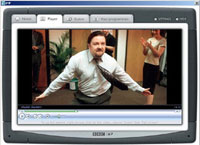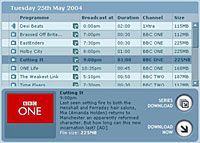 Despite so much current talk from the UK Telco’s and Sky on the magic that will provide an on demand broadcast TV proposition in the UK, tangible evidence of a working model beyond KiT in Hull and Homechoice is pretty sparse.
Despite so much current talk from the UK Telco’s and Sky on the magic that will provide an on demand broadcast TV proposition in the UK, tangible evidence of a working model beyond KiT in Hull and Homechoice is pretty sparse.
The one organisation that is taking it seriously and putting some of their money behind it (sorry, UK TV license payers money) is the dear old BBC.
Digital-Lifestytles has been keeping a close watch on iMP through each stage of its development from its initial announcement by Ashley Highfield at the Digital-Lifestyles theme day at IBC in 2003, through our uncovering that all of its content would be DRM protected back in Feb 2004, to the announcement of the trial, back in May this year.
I’ve been lucky enough to be one of the trialists for the iMP (that’s integrated media player not interactive as so many insist on calling it) and I can tell you it’s not at all bad. Viewing TV on a PC screen is not ideal and that has probably influenced the programmes I’ve chosen – largely factual and quiz. The BBC counters that, a ‘box’, is under development to port the output to your domestic telly and reminds us that it’s already possible to view the content on a selection of mobile devices.
 Despite the somewhat limited selection of programmes, which I’m told is largely down to copyright issues, it seems a positive move for a public sector broadcaster actually providing a service and solving the ‘problem’ of letting you see a programme you forgot to record or you later discover is worth viewing.
Despite the somewhat limited selection of programmes, which I’m told is largely down to copyright issues, it seems a positive move for a public sector broadcaster actually providing a service and solving the ‘problem’ of letting you see a programme you forgot to record or you later discover is worth viewing.
The operation, as you’d expect from a Microsoft product is ‘workperson-like’ ,if rather un-exciting, but to all intents and purposes, to those with an always-on connection, downloading the content is free. The technology that allows programmes to be downloaded in faster than real time on a 2mb connection is a completely legal (I’m told) peer to peer application – everyone who is running the trial software, shares their content with other on the trial, without their having to do anything.
The built-in DRM expires the programmes after seven days which, when compared to the analogue world, I haven’t noticed happening on my VHS tapes. It’s been necessary to quell the agonies protested by the copyright owners.
 The BBC is thinking beyond the present Windows-only solution. Speaking recently in London the BBC’s Project Director for iMP Ben Lavender reinforced the BBC philosophy of platform agnosticism and spoke of the desire to work on Apple and Linux solutions when DRM issues can be satisfactorily dealt with.
The BBC is thinking beyond the present Windows-only solution. Speaking recently in London the BBC’s Project Director for iMP Ben Lavender reinforced the BBC philosophy of platform agnosticism and spoke of the desire to work on Apple and Linux solutions when DRM issues can be satisfactorily dealt with.
For commercial broadcasters there’s an over-riding issue to deal with, should they choose to get involved. How would they deal with the ease which you can move through spot advertising, remains to be seen but that’s an issue they’re’ going to have to face soon one way or another.
My verdict – I give it a thumbs up as long as a large enough library of content can be made available. For drama and the like, I’d want an easy method of outputting to the living room TV.